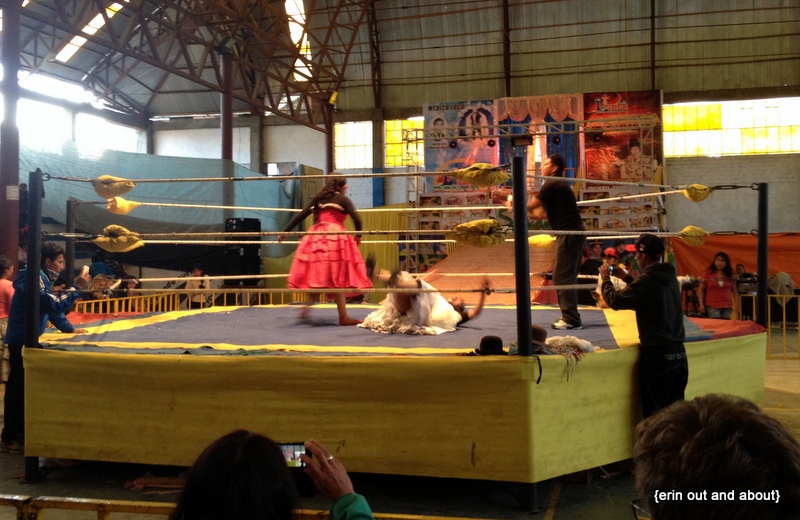"So I'm thinking while we're there we'll take the Teleferico, I really want to visit El Alto market, and go to a cholita wrestling match." That's how the conversation started when Eimear told me her itinerary for La Paz, Bolivia.
"Yeah! Cholita wrestling is where these bad-ass Bolivian women wrestle each other like WWE style." She explained.
"Uh, that sounds so weird and amazing! We're totally going!"
Despite any first impressions you might have, the fighting cholitas are helping to empower the mostly indigenous women who take part in this form of professional entertainment. Not only 'proving their worth' in a man's world, but enabling the female working class to earn their own money and gain independence. She tends to her family and everyday life during the week, but come Sunday evening she can be found in the ring in front of hundreds of spectators, preforming moves and story lines inspired by American WWE and Mexican lucha libre professional wrestling.
The word cholita used to be a derogatory term for the peasant Aymaran and mixed raced women, but over time they have made claim to the term and wear it now with pride. It reflects their strong, resilient nature, bold and confident attitude.
For me, part of the appeal was to watch the cholitas battle it out while in their traditional garb which consists of long braided hair, a bowler hat, la pollera; a colourful skirt cut just above the ankle (believed to be the most beautiful part of a Bolivian woman), les enaguas; layered, frilly petticoats to give volume to the skirt, la blusa; long or short sleeved blouse, la manta; llama or alpaca wool shall worn on the shoulders, and los calzados; flat, rounded toe shoes. The twirling and swirling skirts was mesmerizing. Surreal is the most appropriate word. I admired one performer's ballet flat while cheering the other one on as she climbed the ropes preparing to jump her opponent.
There's story behind the bowler hat worn by the cholitas, as you might expect. Back in the 1870s when the railways were being constructed by British engineers in Bolivia, a shipment of bowler hats were sent for them to wear. When the hats arrived it was discovered that many of them were too small to fit the men's heads. Rather than throw them away as wasted stock, some salesman got crafty and told the cholitas that these hats were the height of fashion for European women. The hats were also believed to help with a women's fertility. Today the hats, worn with pride, tell the marital status of a Bolivian woman; worn in the middle means married, to the side, she's single or widowed, and tilted to the back "it's complicated"!
Originally, it was just men in the ring, but about 12 years ago cholita wrestling moved into the mainstream. It was an opportunity for women in domestic abuse and similar situations to get out their frustration and gain confidence. Not until local wrestler and promoter thought to move the cholitas on to the main stage did they start with a money making enterprise. They recently started their own association.
While travelling the countryside from La Paz to Uyuni I did start to notice stores, restaurants, and even street vendors--everyone really, watching wrestling imported from Mexico and America. Bolivia loves wrestling!
The evening starts with male wrestling before moving on to the cholitas. It's a fun atmosphere with popcorn and drinks. The wrestlers of each match enter the arena with the pomp and circumstance appropriate for the circus about to be witnessed.
The story lines border melodrama and comedy, and even if you can't understand Spanish it is clear who the goodies and the baddies are.
The audience is encouraged to participate in the antics with boos and cheers and by throwing things at the wrestlers, in turn they are sprayed with water and Coke.
We booked our tickets through a travel company which gave us transportation up to El Alto, and a drink ticket for the event. On the bus ride over one of the performers talked to us, telling her story and explaining the clothing and training the cholitas go through to prepare. She was 16 years old and has only been preforming for a year. A cholita must train for at least a year before they are allowed to fight publicly.
They train hard to learn the sometimes acrobatic moves and how to not hurt themselves during a fight.
It was odd being so entertained by people jumping on each other and bashing it out. We had worried that we would hate it and want to immediately leave, but these women know how to work a crowd and just like the word 'cholita' and the bowler hat, they have adopted lucha libre and made it uniquely theirs.
"It's either going to be good craic or cringe worthy." Eimear finished her thought. I'm glad it was the former.
If you find yourself in La Paz on a Sunday or Thursday, don't hesitate to get your ticket to the main event.
Don't miss a post!















Sounds like a truly cultural event!
ReplyDeleteIt was certainly something!
ReplyDelete